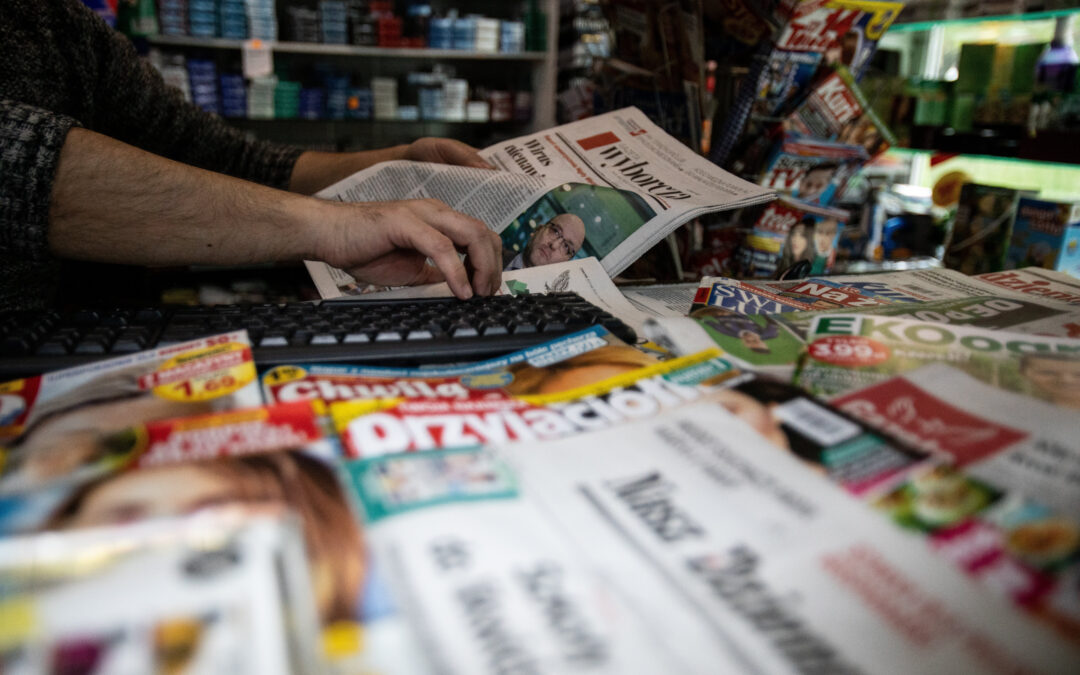Polish state energy firm PKN Orlen has agreed to buy Polska Press – a media firm that owns hundreds of local newspapers and websites – from its German owner, Verlagsgruppe Passau.
The move is seen as a step towards the long-stated aim of Law and Justice (PiS), Poland’s national-conservative ruling party, to “repolonise” the media by reducing foreign ownership. Critics fear the policy is aimed at exerting greater government control over the press.
Orlen’s talks over buying Polska Press were first revealed in October. Today, the firm’s CEO, Daniel Obajtek, confirmed in a video on social media that the sale had now been agreed. “Thanks to this transaction, we will gain access to 17.4 million users of websites belonging to the group,” he said.
Przejmujemy wydawnictwo @Polska_Press. Dzięki transakcji zyskamy dostęp do 17,4 mln użytkowników portali wchodzących w skład Grupy. Pozwoli nam to skutecznie wspierać sprzedaż i rozbudowywać narzędzia big data. To kluczowe zasoby w kontekście planowanego rozwoju sieci detalicznej pic.twitter.com/VarupMAz6w
— Daniel Obajtek (@DanielObajtek) December 7, 2020
As a result, Orlen will take ownership of 20 out of Poland’s 24 regional daily newspapers as well as a further 120 regional weeklies, notes Business Insider. Among its titles will be Gazeta Krakowska, Głos Wielkopolski and Express Bydgoski.
Its new portfolio also includes hundreds of websites, including the various local news portals under the NaszeMiasto (OurTown) brand, which together have over 10 million users, reports Puls Biznesu.
The move follows last month’s announcement that Orlen – an oil refiner and petrol retailer that is Poland’s largest company by revenue – and a group of other state-owned firms would be taking control of Ruch, a major press distributor.
Obajtek says that these decisions reflect “a new strategy…[to] support the dynamic development of [our] retail network. Buying Polska Press and Ruch, as well as establishing a media agency, Sigma Bis, will provide the data and capacity to create “better geographical coverage and tailor [our] offer to customers”.
This “will strengthen sales of the entire Orlen group, optimise marketing costs, and enable further expansion of big data tools”, claimed Obajtek in a statement released by the company, which has not revealed how much it is paying for the deal.
Others, however, see a political motive behind such decisions, with the government seeking to exert greater influence over the media landscape.
State-owned firms in Poland have long been under government influence, though observers have noted an increase in political appointments under PiS. Obajtek, who previously served as the mayor of a rural community of 11,000 people, has seen his career accelerate through various state-linked entities since PiS came to power in 2015.
In October, a deputy prime minister, Piotr Gliński, declared that, “wherever it is possible, state-owned companies should buy media”.
“It is not a normal situation that practically all the local press in Poland is in the hands of…a German corporation,” he told RMF FM. Orlen is “a beautiful Polish company,” he added, and when it comes to media ownership it is “better Polish than German”.
The deal is believed to include 20 out of 24 regional daily newspapers in the country, 120 weekly magazines & 500 local websites.
All under indirect control of the Government.
Do I really need to spell out the possible consequences for media freedom? @risj_oxford @MeeraSelva1
— Jakub Krupa (@JakubKrupa) December 7, 2020
Another deputy prime minister, Jarosław Gowin, has previously said that German-owned media in Poland “represent German interests”. Any “self-respecting state and self-respecting nation cannot allow most of the media to be in someone else’s hands,” he said last year.
At the national level, most media outlets are Polish owned. However, German ownership has been much more widespread among regional and local newspapers.
During this summer’s presidential election campaign, PiS and its candidate, incumbent Andrzej Duda, launched a number of attacks on German-owned media, whom they accused of trying to influence the election in favour of the opposition.
Earlier this year, PiS chairman and Poland’s de facto leader, Jarosław Kaczyński, announced that his ruling coalition would be seeking to introduce legislation aimed at “repolonising” the media. He admitted, however, that the “international reaction” would make this hard.
As well as potentially violating EU law, any rules reducing or limiting ownership would also damage relations with Washington, a vital ally.
One of Poland’s largest television stations, TVN, is owned by US firm Discovery. In October, the US and German ambassadors to Warsaw met to discuss, among other issues, “media freedom” in Poland.
The US envoy, Georgette Mosbacher, has regularly defended TVN from attacks by state entities. She also publicly criticised the idea of “forcing media companies to sell shares”. This would “limit freedom of speech” and benefit “state-owned outlets”, leaving “fewer diverse voices”, she warned.
Main image credit: Agencja Gazeta / Jakub Orzechowski

Daniel Tilles is editor-in-chief of Notes from Poland. He has written on Polish affairs for a wide range of publications, including Foreign Policy, POLITICO Europe, EUobserver and Dziennik Gazeta Prawna.




















